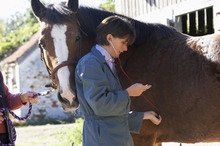The U.S. Department of Agriculture has reported Vesicular Stomatitis (VS), in the State of Texas with five horses confirmed as having the viral disease. The confirmed cases are in Kinney County, southeast of Del Rio.

Protecting horse health with a quarantine
The U.S. Department of Agriculture has reported Vesicular Stomatitis (VS), in the State of Texas with five horses confirmed as having the viral disease. The confirmed cases are in Kinney County, southeast of Del Rio.
The horses were tested after the owner noticed blistering and swelling on the horses' muzzles and contacted the local veterinarian.
Because of the contagious nature of the disease, the horses have been quarantined for a minimum of 21 days or until all lesions have healed and a decision is made to remove the quarantine.
The USDA has been asked to immediately suspend the issuance or endorsement of export certificates for horses and other equines originating from the State of Texas. They have also been asked to provide a copy of any health certificates for horses and other equines from the State of Texas issued for Canada during the 30 days prior to the outbreak.
Vesicular Stomatitis can be transmitted from animal to animal or by blood sucking insects. Black flies and sand flies are known to be carriers of the disease. Nearby moving water is often associated with these insects.
Crusting lesions of the muzzle, loss of appetite, lameness due to foot lesions are some of the symptoms of the disease.
